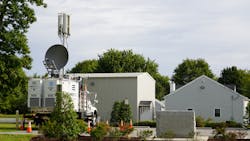Spotlight On: The First Responder Network Authority
“So, what’s FirstNet?” You may have heard this on a tradeshow floor. You may have overheard it in the locker room. You may have even asked it yourself. Set to the most simplistic of explanations, the First Responder Network Authority is an organization established by congress that oversees the implementation of the FirstNet communications network built with AT&T. What the FirstNet Authority is not is the provider of the service.
I connected with Assistant Chief Harry Markley (ret.), and subject matter expert for FirstNet Law Enforcement. “We’re no more a vendor than the FBI is a vendor. We’re actually part of the federal government,” he says.
Harry Markley is the law enforcement liaison for the FirstNet Authority. His experience includes over 31 years as a police officer, retiring from the Phoenix Police Department as chief of the patrol division. He’s been with the FirstNet Authority for about two years and has since produced a newsletter sharing news and information with law enforcement. I spoke with him mid-May.
The FirstNet network has been in operation for two years and, according to Markley, 99% of the U.S. population is covered with 12,000 public safety agencies. That’s breaks down to 1.3 million connections worldwide—a significant milestone for a network so young.
It’s this acceptance that keeps Markley optimistic and parallels the network’s advancement to the Apple iPhone. “The iPhone came out 11, 12 years ago. I remember when you looked at the phone you had about 50 apps on it…and we thought it was the most amazing thing in the world. Now, if you look at the iPhone today and the 100’s of thousands of apps, the capabilities of the camera—those are the leaps to be made.
I just think about where we will be in another 10 years. Just like the iPhone, what this network is going to be able to do and how it’s going to be used are going to be amazing. It’s going to have a significant impact on not just law enforcement but on public safety as a whole.”
AT&T won the FirstNet bid and are partnered together in a 25-year long contract. While the organizations aren’t responsible for the technical side, they’re comprised of teams to oversee various aspects (like confirming reported speeds) to make sure that the build deadlines are being met.
The other side of the First Responder Network Authority organization comprises of education: what FirstNet is, what Firstnet can do, what Firstnet can’t do, and whether or not FirstNet is even the correct choice based on circumstances, location and if the service is right for the agency at the time. With his experience of going from a heavily populated area in Phoenix to the middle of nowhere within Arizona, Markley is realistic and cuts to the point, “It might not be right for everybody. That’s part of my job. Talk to them, find out what their needs are. What their resources are. Where they are located on the planet and if this is the right service for them at this time.”
It starts with coverage. Put simply, without cellular coverage you can’t talk on your phone. Without cellular coverage you can’t use data. But that doesn’t mean that coverage can’t move where you need it. Should there be a need where there isn’t coverage—say, responding to a wildfire in the middle of nowhere—a fleet of deployable units can be sent to the location. You can even use a tethered drone with a ground-based power source to provide a temporary cellular tower.
What about the radio?
Consider the computer in the patrol vehicle. Consider your smartphone. Often cellular coverage for these devices can go where radio coverage hasn’t. “We’re not looking to replace mobile radios,” Markley says. He tells me a story from Arizona, where Phoenix, the fifth largest city in the U.S., is heavily populated – there are extremely rural areas. “Areas where our state police don’t have any radio coverage at all”, he says. Once they hit radio darkness, officers were flying blind with the closest back up an hour or more away. FirstNet built with AT&T were able to provide a solution to allow officers to use their mobile phones to communicate to dispatch through an LTE-LMR integration. One trooper was quoted, “Now I can do police work again.”
Markley goes around the country demonstrating the capabilities of FirstNet, by making a call from Florida to dispatch in Arizona in the midst of IACP 2019 as well as utilizing the new Push to Talk app to connect to California while in Guam.
Can I sign up?
Many officers inquire about 1) whether they qualify and 2) if they can sign up privately. Short answer: yes, if an officer wants to be on the network on their own—they can.
Oftentimes, many people consider public safety as only police, firefighters, and EMTs— but the FirstNet Authority includes so much more. “It’s not always sworn,” he says. “There are task forces that are made up of military and civilian and they do search and rescue for a sheriff department, or they’re a part of a drug task force where they aren’t actually a sworn law enforcement officer but they provide support.” Law enforcement agencies and officers alike can contact AT&T for more information on who qualifies for access on FirstNet.
The network is only in its infancy. “We’re so early on in this process that what we’ll look like even five years from now will be so much different than what it looks like now,” says Markley. “When you look at live streaming video, when you talk about being able to live stream dash cam video, body cam video, video cameras on the end of electronic weapons. The possibilities are endless.”
Find more information at FirstNet.gov/police.

Jonathan Kozlowski
Jonathan Kozlowski was with Officer.com, Law Enforcement Technology, and Law Enforcement Product News from August 2006 to 2020.
As former Managing Editor for Officer Media Group, he brought a dedicated focus to the production of the print publications and management of the Officer.com online product and company directory. You can connect with Jonathan through LinkedIn.
Jonathan participated as a judge for the 2019 and 2020 FOLIO: Eddie & Ozzie Awards. In 2012, he received an APEX Award of Excellence in the Technology & Science Writing category for his article on unmanned aerial vehicles (UAVs) in police work, aptly titled "No Runway Needed".




